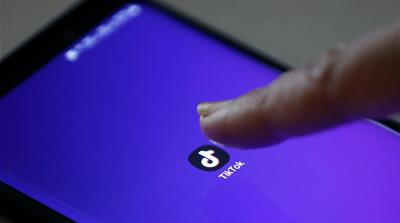TikTok leaves Hong Kong after China security law enactment
TikTok’s move follows decision by US social media giants to suspend processing user data requests by Hong Kong gov’t.

TikTok will exit the Hong Kong market within days, a spokesman told the Reuters news agency, as other technology companies including Facebook, Google and Twitter suspend processing government requests for user data in the region.
The short-form video app owned by China-based ByteDance has made the decision to exit the region following China’s establishment of a sweeping new national security law for the semi-autonomous city.
Keep reading
list of 4 itemsCould shipping containers be the answer to Ghana’s housing crisis?
Are Chinese electric vehicles taking over the world?
First pig kidney in a human: Is this the future of transplants?
“In light of recent events, we’ve decided to stop operations of the TikTok app in Hong Kong,” a TikTok spokesman said late on Monday in response to a Reuters question about its commitment to the market.
Last week, China’s parliament passed sweeping new national security legislation for the semi-autonomous city, setting the stage for the most radical changes to the former British colony’s way of life since it returned to Chinese rule 23 years ago.
While TikTok’s withdrawal may be viewed as support for the pro-free speech camp, the Chinese-owned service – which likes to portray itself as mainly a fun venue for self-made music videos – has come under fire repeatedly for censorship.
TikTok has faced persistent allegations its decisions on content align with Beijing’s priorities.
It has targeted videos related to pro-democracy protests in Hong Kong, the mistreatment of Muslims in China’s Xinjiang region, and standoffs at the India-China border.
Last year, a ByteDance spokesman told the Bloomberg news agency that TikTok did not remove videos of the Hong Kong protests for political reasons, saying they may have instead been taken down for violating guidelines around violent, graphic, shocking or sensational content.
TikTok, now run by former Walt Disney Co executive Kevin Mayer, has said in the past that the app’s user data is not stored in China.
TikTok has also said previously that it would not comply with any requests made by the Chinese government to censor content or for access to TikTok’s user data, nor has it ever been asked to do so.
The Hong Kong region is a small, loss-making market for the company, one source familiar with the matter told Reuters. Last August, TikTok reported it had attracted 150,000 users in Hong Kong.
Globally, TikTok has been downloaded more than two billion times through the Apple and Google app stores after the first quarter this year, according to analytics firm Sensor Tower.
The source said the move was made because it was not clear if Hong Kong would now fall entirely under Beijing’s jurisdiction in light of the new law.
Global appeal
TikTok was designed so it could not be accessed by mainland China. That was part of a strategy to appeal to a more global audience. Its equivalent on the mainland is called Douyin.
There are no plans currently to introduce Douyin to the Hong Kong market, a ByteDance spokesman said.

Although Douyin is not available on overseas app stores, it has gathered more users than TikTok in Hong Kong, according to a second source familiar with the situation. Mainland Chinese users can download the app while in the mainland or by switching accounts.
“Douyin has lots of users in Hong Kong and will continue to serve the users there,” ByteDance China CEO Zhang Nan said in a statement.
Fang Kecheng, an assistant professor at the Chinese University of Hong Kong, said TikTok’s move highlighted the dilemma faced by Chinese companies trying to internationalise, adding that it was “inevitable”.
“You have to follow local policies and try not to offend the Chinese government and the public. ByteDance’s separation of TikTok [from Douyin] was the same strategy.”
ByteDance, the world’s most valuable startup, operates some of the most popular social media platforms.
TikTok in just a few years became the destination of choice for mainly younger Americans and lip-syncing, dancing Indians. Douyin and other services such as Toutiao have grown into major venues for more than 1.5 billion people in its home country and beyond.
But that virality is provoking scrutiny around the globe about both its control of valuable personal data – particularly of youths – and censorship policies deemed pro-Beijing.
On Monday, US Secretary of State Michael Pompeo told Fox News “we’re certainly looking” at a ban on Chinese social media apps including TikTok.
It is also the largest and most prominent of 59 Chinese services India has banned, reflecting growing tensions between the neighbouring countries after a deadly border skirmish in the Himalayas.